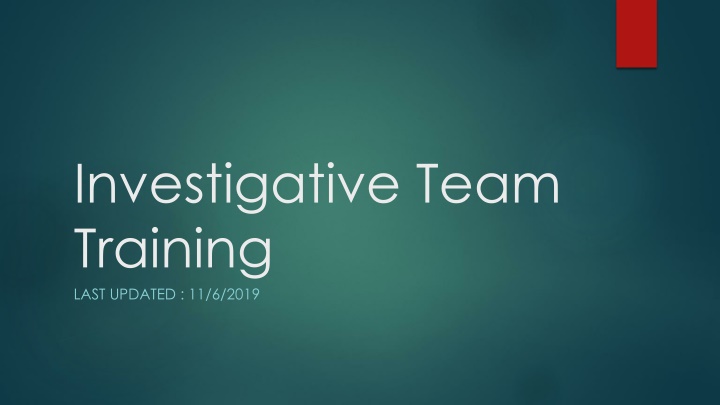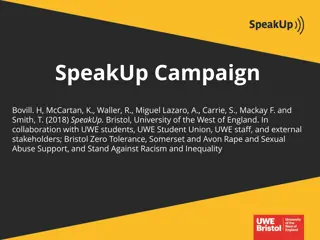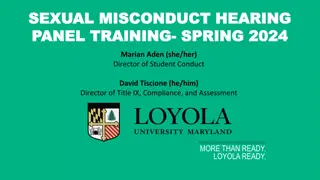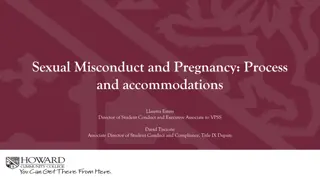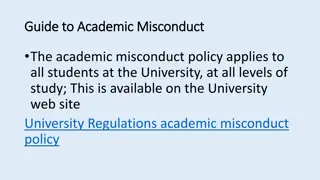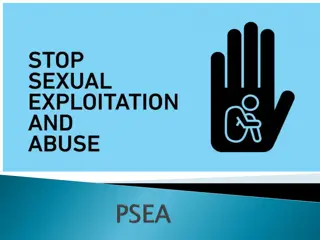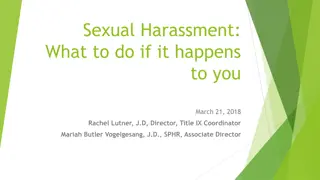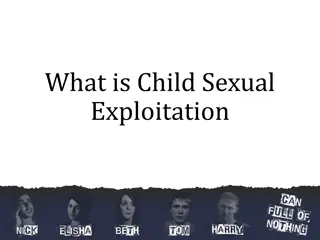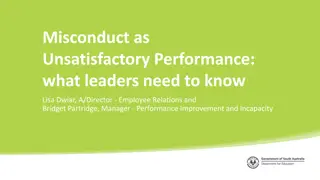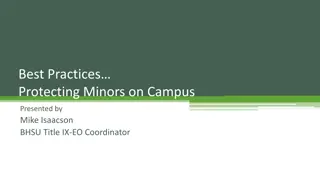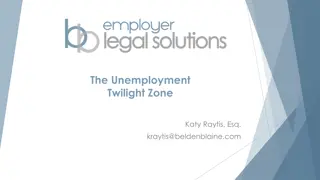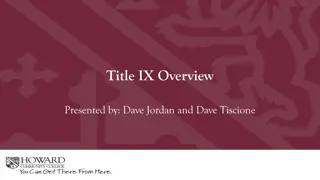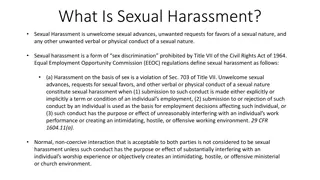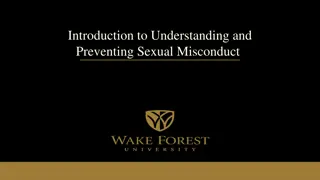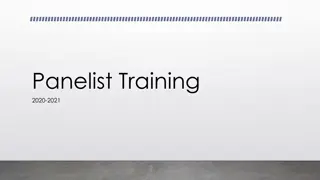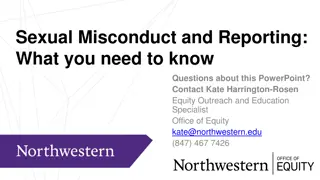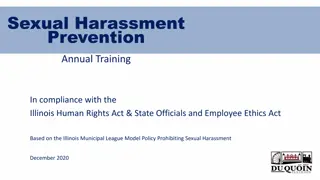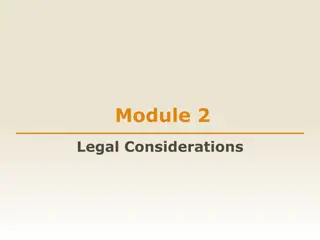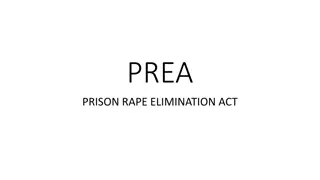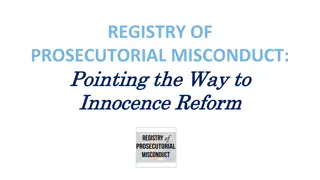Sexual Misconduct Policies & Definitions in Educational Settings
Definitions and policies regarding sexual misconduct, consent, incapacitation, and Title IX implications in educational environments. Understanding consent, incapacitation, and hostile environment scenarios to prevent and address sexual harassment and exploitation.
Download Presentation

Please find below an Image/Link to download the presentation.
The content on the website is provided AS IS for your information and personal use only. It may not be sold, licensed, or shared on other websites without obtaining consent from the author.If you encounter any issues during the download, it is possible that the publisher has removed the file from their server.
You are allowed to download the files provided on this website for personal or commercial use, subject to the condition that they are used lawfully. All files are the property of their respective owners.
The content on the website is provided AS IS for your information and personal use only. It may not be sold, licensed, or shared on other websites without obtaining consent from the author.
E N D
Presentation Transcript
Investigative Team Training LAST UPDATED : 11/6/2019
Consent Consent is knowing, voluntary and clear permission by word or action, to engage in mutually agreed upon sexual activity. Since individuals may experience the same interaction in different ways, it is the responsibility of each party to make certain that the other has consented before engaging in the activity. For consent to be valid, there must be a clear expression in words or actions that the other individual consented to that specific sexual conduct. A person cannot consent if he or she is unable to understand what is happening or is disoriented, helpless, asleep or unconscious for any reason, including due to alcohol or other drugs. An individual who engages in sexual activity when the individual knows, or should know, that the other person is physically or mentally incapacitated has violated this policy.
Incapacitation Incapacitation is defined as a state where someone cannot make rational, reasonable decisions because they lack the capacity to give knowing consent (e.g., to understand the who, what, when, where, why or how of their sexual interaction). This policy also covers a person whose incapacity results from mental disability, involuntary physical restraint and/or from the taking of incapacitating drugs.
When is something TIX? When it creates a hostile environment Severe, persistent, or pervasive AND objectively offensive It interferes with, denies, or limits an individual s ability to participate in or benefit from the Institute s educational, social, residential programs, employment, or benefits of employment
Sexual Misconduct Definitions Sexual Harassment Sexual harassment is unwelcome, sexual, or gender-based verbal, written, online, and/or physical conduct. Non-consensual Sexual Intercourse any sexual penetration or intercourse (anal, oral or vaginal) however slight with any object by a person upon another person that is without consent and/or by force Non-consensual Sexual Contact any intentional sexual touching however slight with any object by a person upon another person that is without consent and/or by force
Sexual Misconduct Definitions Sexual Exploitation Sexual voyeurism (such as watching a person undressing, using the bathroom or engaged in sexual acts without the consent of the person observed) Taking pictures or video or audio recording another in a sexual act, or in any other private activity without the consent of all involved in the activity, or exceeding the boundaries of consent (such as allowing another person to hide in a closet and observe sexual activity, or disseminating sexual pictures without the photographed person s consent) Prostitution Sexual exploitation also includes engaging in sexual activity with another person while knowingly infected with human immunodeficiency virus (HIV) or other sexually transmitted disease (STD) and without informing the other person of the infection, and further includes administering alcohol or drugs (such as date rape drugs) to another person without his or her knowledge or consent
Reporting Options Responsible Employee (Mandatory Reporters) Confidential reporting on-campus Health Services Counseling Services Confidential off-campus resources licensed professional counselors, local rape crisis counselors, domestic violence resources, local or state assistances agencies, or clergy/chaplains.
Possible Avenues for Resolution Conflict Resolution Only applicable for less serious offenses/violations Parties agree to appropriate remedies Resolution without a Hearing What the majority of our cases go through, and where you come in! Formal Hearing Used if a responding party denies responsibility for all or part of a policy violation after finding Also used if responding party admits to responsibility but either party rejects the sanctions imposed.
RHITs Role To fact-find and determine if a Rose-Hulman policy has been violated or not Separate from a criminal process We can assist folks in getting this process started if they wish, but we are not required to report to law enforcement
Your possible roles Investigative Team Hearing Panel Process Advisor
Conflict of Interest Is it possible that you have a bias or other conflict that would prevent you serving in this capacity based on who the students are? For example, perhaps we have made previous conduct rulings against this student and think we know the type of student this person is How can we work past this?
Process Flowchart Report/Complaint filed with TIX Coordinator Gatekeeping (is the report under Title IX) Appropriate Resolution method determined Investigative team makes a recommendation for finding Interim remedies enacted Investigative team fact-finds and collects evidence Conflict Resolution with both parties Investigative team assigned At least one party does not accept finding or sanctions Title IX Coordinator and Dean of Students determine final sanctions and notify both parties Formal Hearing Both parties accept finding and sanctions Appeal* Process Ends
Evidentiary Standard Preponderance of evidence 50% plus a feather More likely than not
Investigator Skills Questioning Evidence Collection Evidence Analysis Credibility Determinations
Interviewing Recording conversation for accuracy, but one person taking notes and recording the details is preferred Always want to ask if there are other people who would have evidence that can be contributed After each interview, a summary should be put together, and ideally provided to the student to verify the information
Collecting Evidence Even though you are collecting info after the fact, there are still many forms of evidence you can collect Video, text messages, written notes or letters all can be copied or collected Even lock logs on campus can be obtained to verify a timeline or event if needed
Weighing Evidence Documentary Evidence (supportive writings or documents) Electronic Evidence (photos, texts, videos) Real Evidence (physical object) Direct or testimonial (personal observations or experience) Circumstantial evidence (not eyewitness, but compelling) Hearsay Evidence Character Evidence (generally little value or relevance) Impact statements
